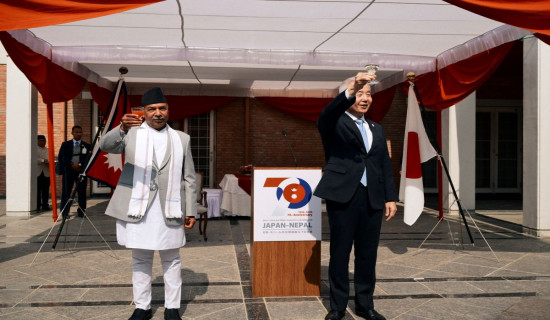- Wednesday, 11 February 2026
Procedural Hurdles Deny Justice To Rape Victims
Mechanisms for legal remedy have disappointed rape victims and their immediate families as our courts are overwhelmed with rape caseload. Rape survivors yearn for seeing their accused behind bars. However, given the massive number of rape cases, the data suggests that an extraordinarily small number have been prosecuted due to deficiencies in procedural and legal aspects. Rape prosecution starts with filing a First Instance Report (FIR) following the pre-trial proceedings and ends with judgment from the District Court. Further, the appellate procedure adds an additional layer of complexity as it involves multiple levels of review, and can take months or even years for the verdict to be final.
It is needless to say that the country has seen a dramatic increase of rape cases in recent years. The stats from the Crime Investigation Department show that a total of 2,380 cases of rape were reported in the year 2078/2079. The data from the Supreme Court Annual Report reveals that out of 5,014 recorded cases in the Supreme Court, 2409 cases were settled and 2,605 are still pending.
The number of pending cases was 1,628 in the High Court and 1,259 in the District Court the same year. Its wider impact has affected victims, their families, the court system, and faith in justice. The existing myriad loopholes should be identified and sorted timely.
Loopholes
There is no point discussing the general obstacles. A few major procedural hurdles are still left at the corner. One of the least discussed issues is the concentration of the forensic labs in the urban areas. Forensic samples play a critical role in determining the guilt or innocence of the accused in rape cases. However, the investigation process is hindered by delays in obtaining test reports from forensic labs. Currently, these labs are centralised in the Kathmandu Valley and are overburdened with cases. As a result, months can pass before the test reports are available, impeding the progress of investigations. This delay in obtaining crucial evidence undermines the credibility of the prosecution's case and allows room for doubt to be cast on the accused's guilt.
Another crucial factor contributing to delay is when rape cases are handed over to the public prosecutor and reaches the court, the police personnel often consider their job is done. Regrettably, this outlook results in an absence of eagerness when it comes to finding victims and witnesses and guaranteeing their attendance during court hearings. Due to social stigma, prestige, use of force or threat of use of force, many victims and witnesses fail to appear in court on the designated dates. This not only elongates the trial process but also provides an advantage to the defendant undermining the pursuit of justice.
The prosecution of rape cases has been marred by several other weaknesses as well. One of which is the delay in presenting the case file and report to the Office of District Government Attorney. Oftentimes, the police units wait until the deadline is about to expire before submitting the necessary documents. This delay can be attributed to the lack of human resources and excessive caseload in the police units. However, it creates a time pressure for the government attorney, who is then forced to hastily review the facts section and file a charge sheet at the court. As a result, these rushed charge sheets are prone to contain numerous loopholes, undermining the strength of the prosecution.
It wouldn’t be wrong to say that the delay in hearing of the cases is fatal among all. Hearing delay has been a common headache for our judiciary despite its formal rules. One of the primary factors contributing to this issue is the overload of cases in all tiers of the courts. Bearing a heavy burden of cases, coupled with a low number of judges in proportion to the number of cases, leads to a backlog and subsequent delays in the hearings, impeding the timely resolution of cases. To address the situation, the courts of Nepal have adopted an automation system which utilises a lottery system to allocate cases to judges. While it has its numerous advantages, it fails to adequately sort out cases which cannot be heard by the judges. Consequently, many sensitive cases, including rape cases, go unheard as judges cannot decide such cases.
Repercussions of delay
Another exacerbating factor is the frequent acceptance of withdrawal applications of cases which has led to unnecessary delays in the hearing. Though there is a provision for lawyers of both parties to the case to file an application for withdrawal of the hearing twice unless otherwise provided in Law (Supreme Court Rule, 2074, Number 77 and High Court Rule 2073, Number 86). Conversely in practice, justices have accepted such applications far more frequently. Multiple applications for withdrawal prolong the process and cause distress to survivors who are eager for justice and closure.
In cases of rape, the onus of proof lies on the prosecutors, which means that the accused is presumed innocent until proven otherwise. However, this approach goes against the principles of humanistic jurisprudence, as it implicitly places the responsibility of proving the absence of consent on the victims. Since the legal proceedings in rape cases are often complex and plagued by systemic delays, it creates significant barriers for women.
These delays not only intensify the emotional turmoil experienced by survivors but also hinder their healing process. Additionally, they can have detrimental effects on their livelihoods, family commitments, and overall well-being, ultimately influencing their decision to pursue justice. When victims are subjected to prolonged delays that make them feel abandoned, re-victimized, and frustrated, the adage "justice delayed is justice denied" holds true.
(Sharma is a Section Officer at the Supreme Court and a former Assistant Human Rights Officer at the OHCHR.)
















